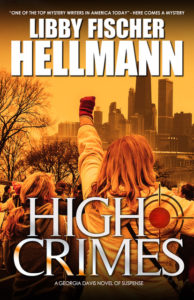Hi, all. I thought you might be interested in an interview I did with BookLife last week (October 19) about HIGH CRIMES . A lengthy excerpt was published in the 10/22/18 edition of Publishers Weekly as well.
. A lengthy excerpt was published in the 10/22/18 edition of Publishers Weekly as well.
Hellmann’s Chicago PI Georgia Davis returns to solve a politically motivated Facebook murder mystery.
What’s different about High Crimes from your previous books?
High Crimes was personal. After Nov. 8, 2016, I spent an entire year in a state of semiparalysis. I couldn’t write. I couldn’t talk about anything but the election. Eventually, I realized that I had given the occupant of the Oval Office all my power, especially where my writing was concerned. I brainstormed two different novels, but they just didn’t resonate.
Then came the eureka moment. A few days after the election, I’d joined a resistance Facebook group, which eventually grew to 42,000 members. Now I asked myself, “What if the leader of a sizeable resistance Facebook group was assassinated? Who would have done it and why? And what if Georgia Davis was hired to look into it?” From that point on, the story took off.
Tell us a little about Georgia Davis, your series, and how the events in High Crimes test her mettle. Georgia was a cop when she first appeared in my Ellie Foreman series. But as soon as she walked onto the page, I knew she would have her own series. She is completely apolitical. If anything, she leans toward the conservative side. Although there is a political slant to High Crimes, Georgia helps make it evenhanded. She also has a finely tuned sense of justice, which allows her to take risks that the rest of us would find unacceptable.
How did you research High Crimes, and how much did current events inspire this book? I didn’t do much research for this book. The daily news cycle provided most of what I needed.
What was it like shifting from a traditional crime-solving milieu to a virtual one, complete with fake profiles? I’ve been writing about cybercrime for a while now. Jump Cut (2016), book five in my Ellie Foreman series, deals with cyberespionage. I love the possibilities that the virtual world offers—and when I combine them with traditional gumshoe detective work, the pace and the plot of a story can take flight.
Do you think true crime is potentially more relevant in our current political climate than before? If so, why? Yes, especially with all the books detailing the crimes and corruption of the current administration. I imagine we’ll see a rash of books about police shootings—for instance, about the murder of Laquan McDonald—as well as histories of the Russian mafia and its leader, Semion Mogilevich, before it’s all over. Criminals are more brazen and fearless today, and their crimes affect more people. It’s not just one or two families who suffer or grieve—it’s often an entire community, and in some cases, a country.
Who is your ideal reader and why?
My ideal reader loves suspense and is unable to put a story down until he or she has figured it out or finished it. That reader loves to explore “the dark side” but ultimately wants justice to be served.
What is the one thing you most want to say about you or your book? High Crimes is a mystery that goes right to the heart of the huge, ongoing conflict with which we’re grappling as a nation. There are no heroes in this novel, either on the left or on the right, but there is Georgia, driving the story toward justice.